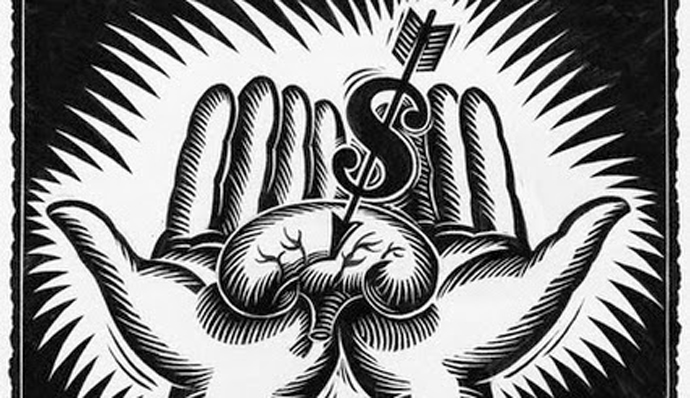Organs trafficking is the purchase of human organs for transplantation, internationally recognised as an illegal trade and a widespread crime. Estimates put the worldwide number of commercial transplantations that involve payment for the organ are about 10,000 annually, roughly 10 per cent of all transplantations. Many countries have laws that prohibit the selling and buying of organs and ban physicians from transplanting organs obtained illegally. This practice is also banned by the World Health Organisation, which requires organ donation to be altruistic. Yet, the shortage of organs for transplantation is a persistent worldwide dilemma and demand for organs significantly outstrips supply. Unable to obtain organs at home, patients from rich countries might choose to travel to developing countries, where they can buy the organ and have it transplanted. In the developing countries, organ brokers lure poor, uneducated individuals into selling their kidneys with a promise of financial gain and a better future. Economic needs drive most organ sellers, but in some cases kidnam and luring street children fills the gap to cover the growing demand.
The organ trade typically takes place in developing countries whose hospitals are advanced enough to offer transplant services. It originated in India in the 1980s; in the following years, Pakistan, the Philippines, Egypt and China (where the organs were alleged became hubs of commercial transplants. Such illegal transplant operations are also known to have been done in Turkey, Kosovo, South Africa and other cites around the world. The patients typically come from the rich countries of East Asia (e.g., Japan and Taiwan), the rich countries of the Middle East (e.g., Saudi Arabia and Israel), as well as the United States and Western Europe. kidney sellers receive only a small fraction of the $100,000-$200,000 typically paid by patients and rarely experience the hoped-for economic improvement in their life. In fact, they may suffer deterioration, which further worsens their financial problems, along with a sense of hopelessness and social isolation. And patients might also be disappointed. Given the often-inadequate pre-transplant evaluation and substandard medical treatment, commercial transplantations might yield poor health outcomes, and put recipients at a higher risk of surgical complications, infections and organ rejection. Compared with other illicit, organ trafficking should be rather easy to curb. Governments are sometimes reluctant to suppress illicit activities that are economically important, such as the trade in drugs or counterfeit goods. But this is not the case with the organ trade that is of little economic significance, financially benefiting a small group of organ brokers and physicians.
Furthermore, fighting the organ trade entails limited law enforcement efforts, since it is less hidden and more detectable than many other criminal activities. The prohibited transplantations do not take place in back alleys, but in a few easily identifiable locations: hospitals and equipped medical centres. The physicians who perform these transplantations can be easily identified, as can the patients who receive the illegal transplants. Before the transplantation operation, they are on the organ wait list in their own countries; and after undergoing the operation, they must receive continuing care, including immunosuppressive drugs. Governments often make little effort to stop the Organs trade as transactions in organs may deceptively seem advantageous to both the organ buyer and seller, while on the other hand, recipients accept the buying of kidneys as a legitimate solution for their medical situation. which makes both generally on agreement terms that rarely involves the legal authorities. On the other hand, Governments also struggle to consider organ-trade participants as offenders, even when they break the law. Physicians, with an aura of respectability, hardly seem like shady criminals. Yet, sadly over the past decade their are several cases around the world regarding disappearance of children and teens, as well as, a larger number of street children in developing countries, a matter that has raised great concern to Governments on the fierceness of how the Organ›s trade industry is developing.
While organ trafficking is a form of human trafficking, international initiatives against human trafficking have focused on the sex trade, paying little attention to the trade in organs which comes hand in hand with the sex trade. In 2008, two international medical associations jointly established the Declaration. This declaration aimed to unify physicians in denouncing the organ trade and motivate governments to enhance ethical, altruistic organ donations. The medical community’s efforts indeed had an impact. Physicians’ advocacy, together with media criticism, brought Israel and Pakistan to pass laws against organ trafficking. The two countries’ involvement in the organ trade saw significant reduction. Legislative prohibitions ultimately mean little without vigorous enforcement, which requires sustained pressure on government authorities. Since the organ trade ranks low in the latter’s priorities, it is the job of the medical community, civil society and the media to raise public awareness and demand action. Tough enforcement, alongside policies to encourage altruistic organ donation, will go a long way toward abolishing the organ trade.


